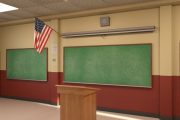
Despite legal prohibitions on providing obscene material to minors, public schools in Florida have been using apparently illegal materials including stories for “literature” involving prostitution, lesbianism, gang rape, marital infidelity, masturbation, masochism, abortion, and more. In Florida school districts where materials were examined by parents and activists, there were more than 60 books with hard or soft porn on recommended readings lists for children as young as 11. More than a few school textbooks used across the state promote false, misleading, or revisionist American history, with books oftentimes filled with factual errors. Books that promote what analysts called “unacceptable Islamic religious indoctrination” were found in almost every Florida county, too. And yet, all of it is already illegal under Florida law.
Now, activists have a plan to make it stop. Groundbreaking legislation being considered in the Florida legislature would create a formal process allowing parents and taxpayers to challenge the use of inaccurate or biased instructional materials such as textbooks in public schools. Under the bill, the criteria for “quality instructional materials” would also be expanded by stipulating that, in addition to being aligned with existing education standards, the content must also be factually accurate, objective, and balanced. Obscene content and inaccurate or biased materials are already banned, but the laws are not being enforced, activists pushing the measure say. This law would be a tool to make sure school materials actually comply with existing law.
Critics of the new measure quoted in media reports argued that it might facilitate the teaching of other views alongside, for instance, the evolution theory and the man-made global-warming theory, both of which are rejected by a majority of the taxpaying public in polls. Ardent advocates of both theories styling themselves “science” supporters claimed that language in the legislation demanding that materials “provide a noninflammatory, objective, and balanced viewpoint on issues” could serve as “a potential back door for inserting creationism and climate change doubts into the classroom.” Lobbyists and textbook publishers are already coming out of the woodwork, too.
But supporters and parents behind the legislation said it was never about teaching bias one way or the other. Instead, supporters said, the goal is to ensure that accurate, high-quality materials are used in the classroom, and that publishers and schools follow existing Florida laws. “This law will empower parents and community taxpayers to have a meaningful seat at the table to significantly improve the quality of instructional materials in public schools and dramatically reduce the indoctrination, revisionist history and porn,” explained Director Keith Flaugh with the Florida Citizens’ Alliance, a liberty-minded coalition of citizens and grassroots organizations pushing the bill.
Among other key objectives, the legislation, HB 989 in the House and SB 1210 in the Senate, seeks to close a number of loopholes in a 2014 education law signed by Republican Governor Rick Scott. That law assigned the responsibility for providing adequate instructional materials to schools districts. It also sought to create a transparent review process for parents to raise objections to inaccurate or biased materials. And it allowed school districts to select and acquire programs as an alternative to buying from state-approved lists. The new measure is being described by advocates as a “fix-it” bill aimed at ensuring compliance. “The original law contained numerous loopholes that resulted in all Florida School Districts ignoring the law,” explained Flaugh.
If and when the new measure is passed into law, it would also give each District School Board greater flexibility to use instructional materials that meet or even exceed the current Florida Standards, which are basically a slightly modified form of the politically toxic Common Core standards pushed by the Obama administration. “This is important because it allows school districts to competitively chase the best rather than the Common Core lowest common denominator, or in Florida, the Next Generation Sunshine State Standards, which are Common Core plus 2 percent,” Flaugh added. Despite a massive outcry among citizens, the controversial national standards have remained largely in place in Florida.
But existing Florida law still mandates that teachers teach, in a professional and historically accurate manner, “the history and content of the Declaration of Independence, including national sovereignty, natural law, self-evident truth, equality of all persons, limited government, popular sovereignty, and inalienable rights of life, liberty, and property, and how they form the philosophical foundation of our government.” The Constitution, the Bill of Rights, and the pro-Constitution arguments found in the Federalist Papers are also required. “American history shall be viewed as factual, not as constructed, shall be viewed as knowable, teachable, and testable, and shall be defined as the creation of a new nation based largely on the universal principles stated in the Declaration of Independence,” the law states. Yet, based on reviews by citizen groups, much of that is not being enforced.
Existing law also required that schools teach “awareness of the benefits of sexual abstinence as the expected standard.” And state laws banning the provision of obscene and lewd materials to minors are being violated on a daily basis in Florida public schools, critics and parents say. The Florida Citizens’ Alliance even compiled a report outlining some of the objectionable material found in Florida schools, much of which can only be described as hard-core pornographic material or blatantly ideological indoctrination.
For example, one book recommended by Florida public schools for children, entitled Beautiful Bastard, features extremely graphic and raunchy descriptions of immoral sexual activity that are so inappropriate they cannot be reprinted here. Another, The Truth About Alice by Jennifer Mathie, promotes obscene, promiscuous, premarital teen sex with multiple partners and, as of late 2016, was still recommend reading for sixth-grade children. Florida statute 847.011 would appear to criminalize the provision of such obscene content to minors, and yet it is happening across the state.
“We have documented many examples of the political bias and religious indoctrination, revisionist history and age-inappropriate sexually explicit material used in seven counties in Florida that clearly violate FS 1003.42(2) and FS 847.011,” Flaugh continued, referring to the relevant state laws. “We have grassroots watchdog groups in seven counties and they have validated that most of our textbooks and examples are in their county — this is because Pearson, PLC now owns over 80 percent of all textbook and online instructional materials sold in the United States. Pearson is a British company and is a monopoly and has no incentive to follow Florida laws and in fact has every incentive to create materials that they can sell to their biggest markets, New York and California.” Despite Florida law, school boards continue to ignore parental and citizen concerns, he added.
Indeed, Florida attorney Steve Bracci, whose children attend public school and who has been deeply involved in trying to hold his local district accountable to state law, reports that even getting existing laws enforced is tough. “This upgraded enforcement legislation is necessary because there is a culture within school districts such as ours in Collier County where our superintendent and her upper administration routinely conflate and lump parents together with so-called stakeholders and community partners in order to lessen the special and natural role that parents have in the education of their children,” he said. “Parents are seen as meddlers in the school district’s statist agendas who simply must be tolerated by our administration.”
Pastor Rick Stevens, who serves as the co-managing director of the Florida Citizens’ Alliance, argued that parents and taxpayers should be able to have more influence on the selection of school materials they pay for. “Selecting the instructional materials that will shape our students’ thinking should be a transparent process conducted in the sunshine,” he explained. Critics of the legislation, he added, were manufacturing “wildly speculative hypotheticals” to argue against it. “Why are they so afraid of a transparent process conducted in the sunshine where local school boards, parents and taxpayers select quality instructional materials that meet the requirements of Florida law?”
State Representative Byron Donalds, the Republican who sponsored the House version of the bill, emphasized that the legislation was an example of proactive thinking. There have been people who have contested some material in classrooms, he said. And so, a few years ago, lawmakers tried to create a “more open process” to resolve those issues. But work remains, he explained. “We want to provide citizens with an opportunity to have input, especially because our citizens pay for the schools but they don’t always have an opportunity to comment on what goes on,” he said. “This would help that process along.”
Donalds, whose wife serves on a local school board, also touted the provision of his bill that mandates factual accuracy and more public collaboration in terms of what is contained in the instructional materials. “We want to put some more structure around this, to get more input from parents and citizens for what’s in classroom materials,” Representative Donalds explained, adding that some textbook publishers had already reached out to him about the bill. “We want to make sure that, on the local level, we have a way to address material that’s not appropriate, or not factual. This way people don’t have to come all the way to the legislature or go the state; people can handle it locally under this bill.”
If the measure passes in Florida, it may well have a national impact, supporters and detractors said. For one, it might encourage publishing houses with a national market to stop publishing inaccurate, pornographic, and biased materials that violate Florida laws — at least if they do not want to publish multiple versions of the textbooks, one for Florida and one for states that do not restrict porn or factual errors. The bill could also encourage parents and taxpayers in other states to get more involved in ensuring that political propaganda, obscene content, and other objectionable material is not forced upon impressionable young children. The Florida Citizens’ Alliance has compiled a list of such content found in Florida schools, and leaders of the group suspect similar material can be found in other states.
Right now, the HB 989 / SB 1210 legislation, entitled “an act relating to instructional materials for K-12 public education,” is being reviewed by school districts across Florida. It is also being considered by various committees in the legislature, including the Florida House PreK-12 Quality Subcommittee, prior to the amendment process. Supporters behind the bill are urging concerned parents and taxpayers to reach out to their elected officials and urge them to support the legislation, and to get more deeply involved in the political process. The stakes are high: The minds of Florida’s children, and therefore the future of the state, are on the line.
Alex Newman is co-author of Crimes of the Educators, and a correspondent for The New American, covering economics, education, politics, and more. Follow him on Twitter @ALEXNEWMAN_JOU. He can be reached at: [email protected]
Related articles:
Common Core-approved Textbooks Rewrite Second Amendment
Twisting Children’s Minds With School Textbooks
Sexually Explicit High-school Textbook Outrages Calif. Parents
Ex-Textbook Company Exec. Admits: Common Core Has Anti-American, Anti-Christian Agenda
UN Demands More Globalist Propaganda in School Textbooks
Common Core: A Scheme to Rewrite Education
Outcry Grows Over Suspension of Student Who Disarmed Suspect
Teachers Ousted From Classroom for Supporting Immigration Law
Bill to Shut U.S. Education Department Introduced in Congress





